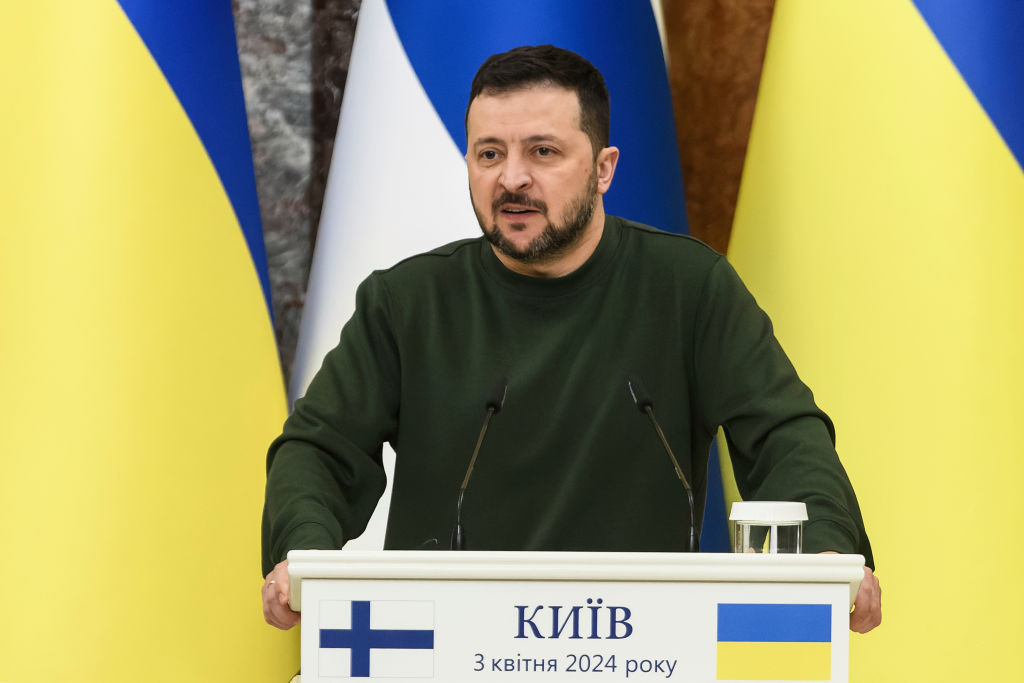Happy Thursday! We hope your day will be better than the Swiss government ministers who had to give up their free, government-issued annual ski passes under pressure from the social media hordes. Ah, vox populi, vox dei.
Quick Hits: Today’s Top Stories
- Former Israeli Defense Minister Benny Gantz—a member of Prime Minister Benjamin Netanyahu’s war cabinet and leader of National Unity, a coalition of opposition parties—on Wednesday called for early parliamentary elections to be held in September. “What Israel needs is quiet in the ballot box, not flames in the streets,” Gantz said. If the current schedule remained intact, the next Israeli elections would fall in October 2026, though Israel has held five elections since 2018. Large-scale demonstrations continued across Israel on Wednesday with protestors pushing for elections and demanding the return of hostages held by Hamas.
- NATO Secretary-General Jens Stoltenberg announced Wednesday that NATO members are exploring plans for the alliance to take the lead on coordinating and providing aid to Ukraine—a role the U.S. played during the first two years of the war through an informal coalition known as the Ramstein Group. “We must ensure reliable and predictable security assistance to Ukraine for the long haul,” Stoltenberg said. However, National Security Council spokesman John Kirby suggested Wednesday that the U.S. isn’t prepared to cede its leadership role. “[The Ramstein Group] is bigger than NATO,” he told reporters. “It’s 50-some-odd nations all around the world, including in the Indo-Pacific—and what brought them together was American leadership.”
- Georgian Dream, the ruling party of the South Caucasus country of Georgia, announced a renewed plan to pass a controversial “foreign agent” security law that would require civil society organizations that take money from overseas to register as operating on behalf of foreign interests. Georgian Dream lawmakers first introduced the law last March, sparking large protests for its close resemblance to a Russian law passed in 2012 used to stifle dissent.
- The judge overseeing former President Donald Trump’s criminal trial in New York over hush-money payments to a porn star in 2016 denied Trump’s request to delay the start of the trial, currently set for April 15. Trump’s legal team had argued the trial ought to wait until the Supreme Court ruled on his claims that the presidency granted him certain immunity from prosecution, but Judge Juan Merchan rejected the appeals, arguing Trump’s attorneys had waited too long to raise their concerns.
Ukraine Battles On

With the war in Ukraine now in its third year, Ukrainian President Volodymyr Zelensky has collected some hard-earned wisdom. “If you are not taking steps forward to prepare another counteroffensive, Russia will take them,” he told the Washington Post’s David Ignatius last week. “That’s what we learned in this war: If you don’t do it, Russia will do it.”
In that spirit, Ukrainian political and military officials are trying to reclaim the upper hand on the battlefield even as stalled U.S. support makes the Ukrainian lines increasingly vulnerable. Earlier this week, Zelensky signed a new and controversial conscription law—which went into effect Wednesday—that could expand the base of men eligible for the draft and potentially relieve exhausted frontline troops. Though it seems increasingly likely that the House of Representatives could pass a much-needed aid package for the besieged country in the next month, as ever in this war, there is no panacea. Meanwhile, Kyiv’s forces are striking deep into Russian territory—despite the U.S. government’s concerns—in an attempt to hobble the Russian war machine.
The first three months of the year have been marked by …
As a non-paying reader, you are receiving a truncated version of The Morning Dispatch. Our full 1,598-word story on the state of Ukraine’s war effort is available in the members-only version of TMD.
Worth Your Time
- Writing for his Substack, Pax Americana, former National Security Council official and CIA analyst Michael Shurkin argued Washington misunderstands the potential for a crisis between Venezuela and Guyana. “I’ve lately been having conversations with D.C. people about American responses to Venezuela President Nicolás Maduro’s threats to annex the Essequibo region of Guyana,” he wrote. “They reminded me once again of how often D.C. establishment people seem to lack imagination when it comes to what potential adversaries might do, sometimes with terrible results. … The reality is that actors like Maduro might not be rational. Or, they are rational but come to different conclusions than we do, for one reason or another. … I do not intend here to make predictions regarding whether Maduro will attack Guyana. Maybe he will, maybe he won’t. I have no idea. My point really is to question the apparent consensus in Washington, D.C. that he won’t and can’t. Indeed, part of the argument why he won’t is the assumption that he can’t. The thing is, he can. And, indeed, he just might.”
- In The Atlantic, Derek Thompson explained his come-to-Jesus moment about religion in America. “I have spent most of my life thinking about the decline of faith in America in mostly positive terms,” he wrote. “Only in the past few years have I come around to a different view. Maybe religion, for all of its faults, works a bit like a retaining wall to hold back the destabilizing pressure of American hyper-individualism, which threatens to swell and spill over in its absence. … On an individual basis, people can give any number of valid-sounding reasons for not frequenting a house of worship. But a behavioral shift that is fully understandable on the individual level has coincided with, and even partly exacerbated, a great rewiring of our social relations. … I’m not advocating that every atheist and agnostic in America immediately choose a world religion and commit themselves to weekly church (or synagogue, or mosque) attendance. But I wonder if, in forgoing organized religion, an isolated country has discarded an old and proven source of ritual at a time when we most need it.”
Presented Without Comment
Axios: House Freedom Caucus Chair Backs Capitol Rioter’s Bid for Congress
Also Presented Without Comment
New York Times: Patient With Transplanted Pig Kidney Leaves Hospital for Home
The first patient to receive a kidney transplanted from a genetically modified pig has fared so well that he was discharged from the hospital on Wednesday, just two weeks after the groundbreaking surgery.
Toeing the Company Line
- In the newsletters: The Dispatch Politics crew reported on the Michigan GOP’s continued infighting and President Biden’s struggles with Catholic voters, Scott gamed out (🔒) the likely consequences of California’s new “fast food” minimum wage law, Jonah argued (🔒) this cycle’s presidential candidates are painfully ignorant of history, and Nick humored (🔒) a recent piece arguing against the 22nd Amendment, which bars presidents from being elected to more than two terms.
- On the podcasts: Sarah and David dig into Federalist Society drama on Advisory Opinions and Jonah is joined on The Remnant Karolina Hird to discuss Russia’s occupation tactics in Ukraine.
- On the site: Charlotte explains the battle in Israel over whether ultra-Orthodox men should be exempt from military service and Mark Wallace remembers the life and legacy of the late Sen. Joe Lieberman.








Please note that we at The Dispatch hold ourselves, our work, and our commenters to a higher standard than other places on the internet. We welcome comments that foster genuine debate or discussion—including comments critical of us or our work—but responses that include ad hominem attacks on fellow Dispatch members or are intended to stoke fear and anger may be moderated.
With your membership, you only have the ability to comment on The Morning Dispatch articles. Consider upgrading to join the conversation everywhere.